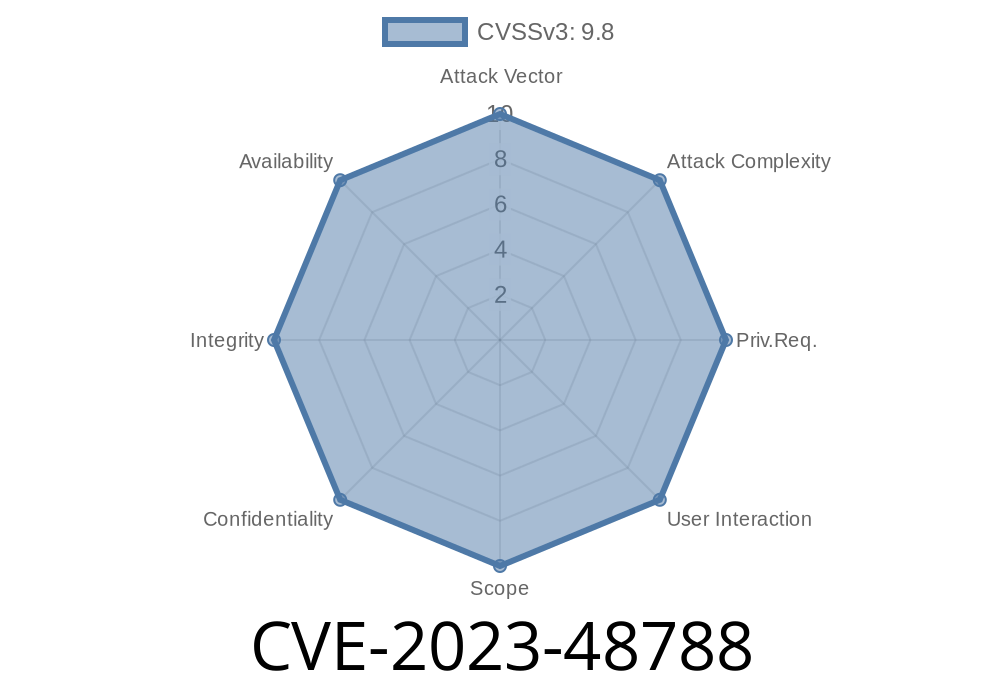---
Introduction
In late 2023, security researchers discovered a critical SQL injection vulnerability in Fortinet FortiClientEMS, a popular enterprise endpoint management software. This flaw, tracked as CVE-2023-48788, impacted versions 7.2. through 7.2.2 and 7..1 through 7..10. In simple terms, attackers could send specially crafted network packets, exploiting improper handling of special characters in SQL commands, allowing them to run unauthorized code or commands.
This post breaks down CVE-2023-48788 in simple language, explains how the exploit works, and shows real-world code examples and references for deeper learning.
What Is SQL Injection?
SQL (Structured Query Language) injection happens when an application does not correctly filter or "escape" harmful characters before passing them to a database. This failure can let attackers sneak in malicious SQL code to steal data, change information, or gain high-level access.
Imagine if a system takes user input and directly adds it to a SQL command. If it forgets to clean up special characters (like quotes, semicolons, or dashes), an attacker can break out of the expected command and inject their own.
Where FortiClientEMS Went Wrong
In the affected FortiClientEMS versions, specific packet handlers did not properly clean up incoming data before adding it to SQL commands. This meant that if an attacker sent a tricky network packet with embedded SQL, the underlying database could run that code.
This is an example in pseudocode to illustrate the kind of vulnerable behavior
# WARNING: This is insecure example code
def handle_login_packet(username, password):
query = "SELECT * FROM users WHERE username = '%s' AND password = '%s';" % (username, password)
database.execute(query)
If username is set to
admin' --
the resulting SQL becomes
SELECT * FROM users WHERE username = 'admin' -- ' AND password = 'password';
The -- makes SQL ignore the rest, so the password check is bypassed. In FortiClientEMS, similar flaws let attackers run whatever code their SQL privileges allow.
Exploiting CVE-2023-48788: Practical Example
Warning: This is for educational purposes only. Never attack networks you do not own or have explicit permission to test.
FortiClientEMS processed certain HTTP API requests and network packets by plugging data directly into SQL strings. Without sanitation, attackers could send packets like this:
POST /api/some_vulnerable_endpoint
Content-Type: application/x-www-form-urlencoded
username=admin' OR '1'='1&password=test
This tricks the underlying SQL to always return true, possibly logging in as any user—even an administrator.
More Dangerous Exploits
With creativity, attackers could use UNION SELECT or other SQL techniques to extract table data—or, if the database allows stacked queries, run system commands.
Example payload
username=admin'; DROP TABLE users; --
This would delete the users table (if the database permissions were poorly set).
The official CVE detail:
Security Advisory from Fortinet:
Fortinet Advisory: FG-IR-23-485
Community write-ups:
Red Team Notes on CVE-2023-48788
CVE Tosser Blog - Fortinet SQLi
OWASP SQL Injection Overview (Recommended Reading):
Impact
- Unauthorized access: Attackers can bypass login checks, access user data, or escalate privileges.
- Data extraction: Attackers can dump sensitive org data—credentials, tokens, device details, and more.
- System compromise: Depending on the configuration, attackers might run arbitrary commands on the OS.
How to Stay Safe
- Update FortiClientEMS: Upgrade to the latest version immediately (any release after 2023-12 covers this).
- Review input validation and use parameterized queries: Never trust user input; always use prepared statements.
Monitor logs: Check for odd login activity or unknown API usage.
- Apply network segmentation: Limit what devices and users can reach management software interfaces.
Conclusion
CVE-2023-48788 is a clear and present reminder: SQL injection is still a top threat. Even mature enterprise software can be vulnerable if software teams slip up on input handling. Always patch quickly, use safe coding patterns, and read advisories carefully. Be safe out there!
If you want more technical details or proof of concept (PoC) code, check out the links above. For blue teams, now is the time to patch and review your exposure.
Timeline
Published on: 03/12/2024 15:15:46 UTC
Last modified on: 03/19/2024 08:15:06 UTC
